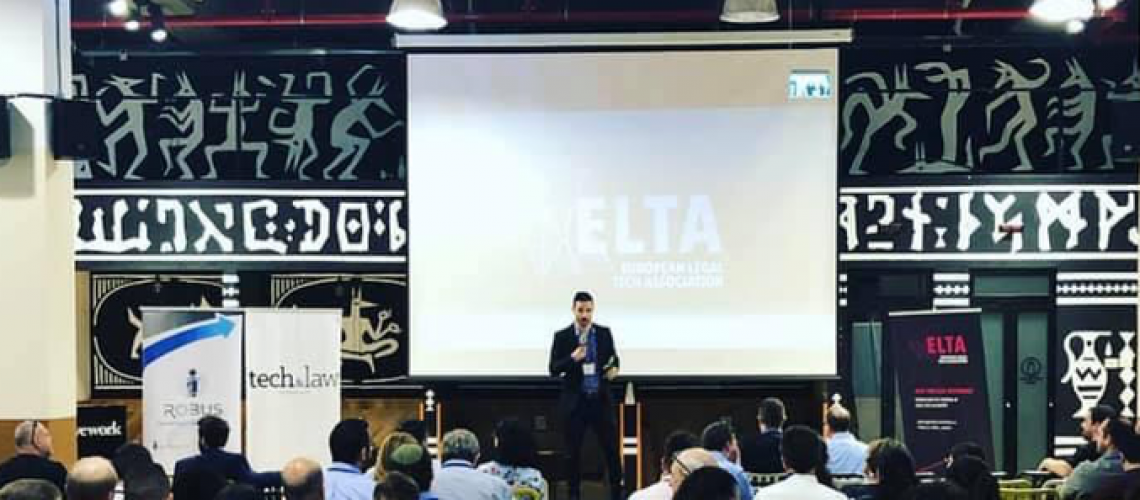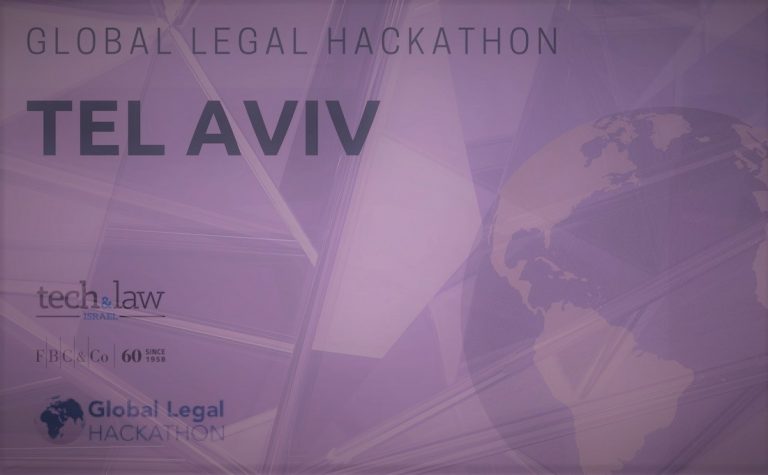Last June, Israel’s third international Legal tech conference was spearheaded by Robus’s legal-tech department, Tech&Law (Israel). Over 250 participants took part in this spectacular event, hosted at the lovely WeWork Hazerem compound, including lawyers from Israel and abroad, legal-tech companies, VC representatives, academics and other curious souls who gathered in order to understand how technology is joining hands with the legal sector. The event also provided attendees a glimpse into how the future of lawyers may look like in the not-too-distant future, making it the most ambitious and grand legal-tech event ever to be seen in Israel
The conference began at dusk; hundreds of people flocked to the compound where they were comfortably seated, and greeted by a variety of muffins and colorful refreshments. Many were treated to a chilly beer tap or opted for one of the dozens of cold beer bottles placed strategically in order to combat the Israeli June-summer-heat.

Outside of the main hall where speakers were showcased, the participants were welcomed with the customary annual Israeli legal-tech exhibition.
This year there were over 10 legal-tech startups situated in Israel who showcased their products, demonstrating to the awestricken lawyers how their product helps to make their professional lives less complicated, and more legal oriented.
Four extremely prominent companies at the conference were PWC–part of the Big 4 accountant firms–SalesForce, one of the largest CRM platforms in the world, Bis-tech, Israel’s largest provider of E-Discovery services, and LawGeex, Israel’s most famous and prestige legal-tech company that is making headlines as one of the best in the field of contract review automation.

Following a marvelous exhibition, the main event had begun. The first to come to the stage was Adv. Zohar Fisher, founder of Robus, Tech&Law department’s company and the man who first brought legal-tech to the Israeli legal market almost 4 years ago.
After congratulating the participants, Zohar spoke about the development of the Israeli legal tech market since the last conference, as well as touching on the processes that came to be in Israeli law-firms, and highlighting how legal departments are slowly adopting more and more legal-technology. Today, he says, there is no doubt that in the near future Israel will become a symbol for exporting legal technology – already today we can see the first sprouts of companies that receive million dollars’ worth of investments.
Our goal is to raise awareness for consuming legal technology in Israel, concluded Zohar, We wish to help Israeli legal tech companies develop and come to the forefront of the international legal-tech market, and receive the exposure they rightly deserve, while developing law firms and legal departments in Israel with the advancement/implementation of technology that is both time efficient, and is quickly becoming a standard practice in mega large law-firms operating abroad.
Following the opening remarks, Zohar passed the microphone to Or Bakai, the conference organizer and the head of the legal-tech department at Robus company. The department is widely regarded as the largest and best source of information regarding the Israeli legal-tech field, and amongst its variety of activities in Israel and abroad – it represents Israel as an ambassador in the European Legal Tech Association (ELTA), the biggest of its kind in Europe.
Or wished to thank the participants that helped make the conference possible, the Israeli legal-tech companies, the esteemed speakers, and of course, the sponsors of the conference. After these short remarks and a presentation of the Tech&Law department, he proceeded to host the evening.

The first speaker for the evening was Professor Dov Greenbaum, head of the Zvi Meitar institute for emerging technologies, lawyer in his profession and a man of several degrees in prestigious universities such as Yale and Berkeley. In his lecture, Dov spoke about the legal and social implications of letting technology enter the legal field.
He said that even though it might seem as if the legal market is doing great – the next drop is hiding right around the corner and in contrast to the last time where law-firms decided to release a large number of lawyers at the same time, he believes the situation will not return to normal so quickly.
The next drop will provide law-firms, and especially those who already made some sort of transition towards technology, an even greater incentive to invest in legal-technology. When that happens, Dov adds, we will see much of the work that is currently being done by interns and young lawyers, being replaced by technology. Even experience lawyers won’t be immune completely to this, warns Dov, since AI is getting smarter and smarter and we predict that in the future it will most probably be able to produce even more sophisticated strategies – something we can already see happening in technologies such as “Predictive Analytics”. Dov finished his lecture by saying that we have a couple of interesting years ahead of us.

The second lecturer of the evening and the Key speaker for the conference was Tobias Heining. President of the European Legal-Tech Association (ELTA), and the Business Development Director of the Germany branch of CMS, one of the world’s largest law-firms. Tobias is a close friend of the Tech&Law department, and has hosted it many times abroad, among other things as the exclusive ambassadors of the ELTA organization. Tobias had acted that evening in the capacity of his role as ELTA’s executive president, an organization that functions as a repository of knowledge and experience in the legal-tech field for law firms and European companies. Tobais arrived on the request of the department in order to share his massive knowledge and answer the question of, “how legal technology has changed the mainstream legal profession in Europe and the world at large”, as well as “how do we see legal technology changing law as a profession, and can we predict how the entire profession will look like in several years?“
Tobias began by noting how in 2014, a moment of transformation dawned on him—a moment where he saw the first major change in the legal-tech sale cycle. The legal-tech field began as a trend in the USA, but since then, it has hit Europe in great waves, which have only become stronger. The financial peak was at 2018, when the sale cycle was so grand it reached millions of Euros.
Tobias added, that the entrance of technology into law firms have completely changed the way law-firms are working on a massive scale, and predicts that in the coming years, we are going to see these changes transform the legal profession in Israel as well. The change will most probably start slowly – focusing on adaptation rate of technology – but there is no doubt that change is inevitable.
The future is “as we design it to be“, says Tobias, we have the power to shape it. If you ask yourselves – “will legal technology replace my workplace?” – Well, the answer is yes, but only if we stand around idly and let it. Only if we make pretend that nothing is happening around as and ignore the technological revolution happening around us. Those who refuse to advance with technology, his fate is to inevitably become irrelevant.
So what should we do? Tobias explains that legal departments and law-firms should be more flexible. They need to balance themselves and catch up with the latest legal-tech products that are already changing the legal world. For legal departments, adds Tobias, there’s a particular significance in using compliance products, and following the latest trend in the market. Polls show that in the near future law firms will include less and less lawyers as the legal tech enter more and more activities which are changing especially the European field, as the legal tech market progresses. And so naturally, the orthodox profession of the lawyer changes, and of course the needs of the clients change as they wish to cover more and more subjects for a fixed price which obviously demands increased efficiency.
There are those who might ask – lawyers (with focus on partners) make a lot of money – why would they want to change the system? The answer could be found in three main elements:
- Technology is becoming cheaper and thus more approachable not only to the big firms but the small firms who would be able to leverage themselves.
- Using technology is becoming standard practice – more and more firms and legal departments are starting to use technology and are serving up a fight to those monster firms who have been leading the market for centuries.
- The costumer is starting to realize that something is very wrong if all their other suppliers are using tech except for their lawyers.

The third lecturer of the evening was Miss Karina Rubinstein, head director in the field of business development in the Israeli innovation authority (former chief scientist). Karina has above 20 years of experience in developing global business markets.
Karina spoke in her presentation about the position of the innovative authority, and about he help that the IIA is giving to entrepreneurs from different levels – “we are supporting all industries in all stages” – Karina is encouraging the legal-tech entrepreneurs to reach out to them – “if you have a winning idea, we will support you even from the very beginning“
Karina briefly explained about the way the IIA works and on the royalty system of the IIA. In principle – in the case that the idea doesn’t succeed – the IIA won’t demand anything, but In case the idea does succeed – the company will pay the IIA royalties for its income gained from the products based on the investment. Of course, part of the idea is converting this investment into shares in the company in the case of huge commercial success.
In conclusion, Karina says, the IIA has recently opened 3 incubators which also provide support to legal-tech entrepreneurs, and she is inviting the various entrepreneurs to send a request for support from the IIA.

The last of the lecturers and the fourth lecturer of the evening was Ilan Admon, CTO and Co-Founder of LawGeex company. LawGeex is considered to be one of the most accomplished legal-tech companies in the world and, a source of Israeli pride. Ilan himself is considered to be a ‘guru’ in the field of AI, with more than 20 years of global experience in the field, as a CTO and as an entrepreneur.
In his lecture, Ilan explained how LawGeex has pioneered solutions in the automation of contracts using artificial intelligence. ‘Sounds scary huh?’ Ilan said jokingly, but added that we have to look at things with the right perspective.
Lawyers are afraid to use automation, but in practice they use these sort of tools all of the time (i.e. IPhone, Siri, google) and there is no reason it should look any different in our place of work. Law-firms have a tough time accepting automatization in legal processes, but if we look at legal departments – there is no way to escape this process – they just can’t handle all those legal documents, it’s not practical and it’s that simple. They may be lawyers, but as in-house lawyers they have to take part in the general processes that occur in the company which force them to become more efficient – this inevitably will occur in law firms as well.
The legal field will have to become more efficient, it is not logical that it will be the only one left behind, highlighted Ilan – the lawyers may be afraid of change but in order to bring the change we cannot be afraid – we have to become enhanced human beings.
Does it mean that robots will replace us in our work place? “I wouldn’t be worried” Ilan says calmly. Legal tech companies don’t try to replace lawyers, that wouldn’t really benefit any of the sides – they do however want to make legal processes more efficient, subsequently allowing a lawyer to use their full potential on more relevant tasks. At this moment, Ilan mentions the famous LawGeex experiment where the company’s AI beat 20 experienced US lawyers in a study of document issue spotting (link), which only comes to show the extent of the potential in using legal technology.
In conclusion, we want to give a warm thanks to all the affiliates who helped making this conference a huge success, including the large amount of people who came, participated and listened.
The Tech&Law department is experienced in assisting law firms and legal departments in implementing legal technology solutions, leading lectures on the subject, and has great knowledge in helping legal-tech companies raise investments and get the boost they need to get into the spotlights of the legal market – in Israel and abroad.
For the website of Israel’s 3rd legal tech conference: https://www.techlaw-conf.com/







